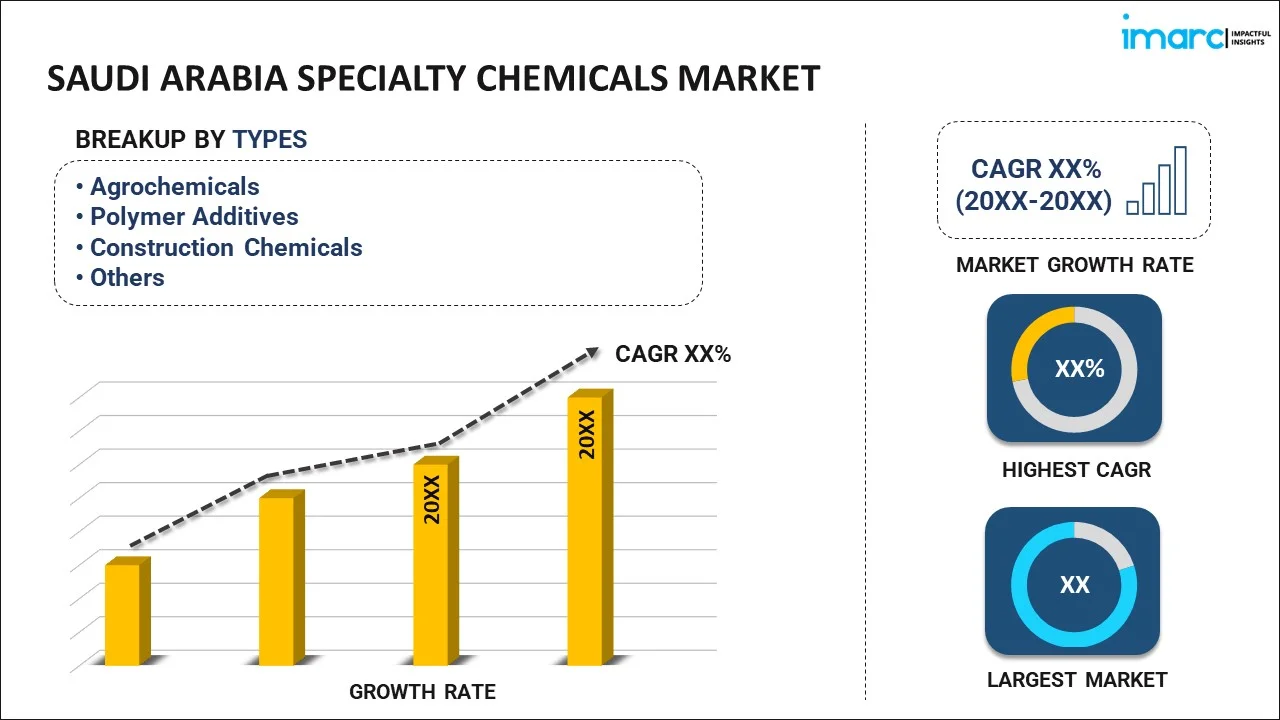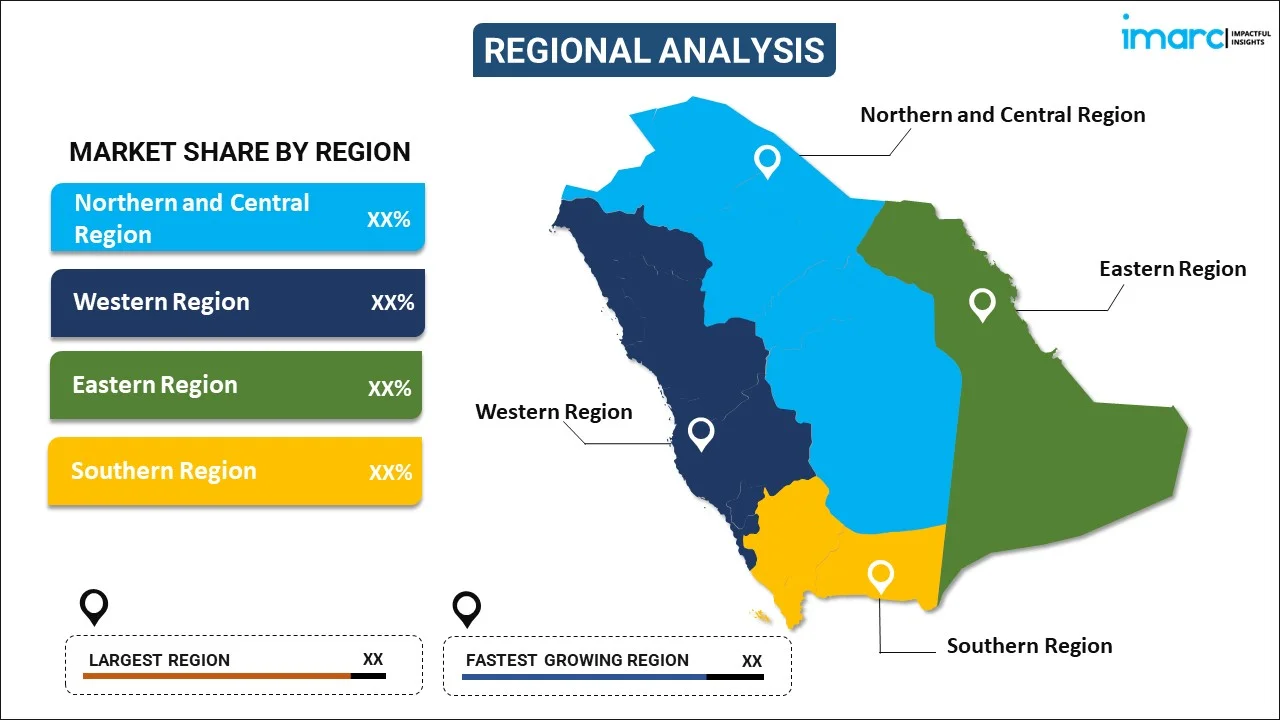
Saudi Arabia Specialty Chemicals Market Report by Type (Agrochemicals, Polymer Additives, Construction Chemicals, Water Treatment Chemicals, Oil Field Chemicals, Food Additives, Surfactants, Electronic Chemicals, Specialty Polymers, and Others), and Region 2026-2034
Market Overview:
Saudi Arabia specialty chemicals market size reached USD 7,543.9 Million in 2025. Looking forward, IMARC Group expects the market to reach USD 10,701.6 Million by 2034, exhibiting a growth rate (CAGR) of 3.96% during 2026-2034. The inflating need for high-performance and function-specific chemicals across different end use industries, such as oil and gas, pulp and paper, personal care, etc., is primarily driving the market growth.
|
Report Attribute
|
Key Statistics
|
|---|---|
|
Base Year
|
2025
|
|
Forecast Years
|
2026-2034
|
|
Historical Years
|
2020-2025
|
|
Market Size in 2025
|
USD 7,543.9 Million |
|
Market Forecast in 2034
|
USD 10,701.6 Million |
| Market Growth Rate 2026-2034 | 3.96% |
Referred to as specialties or effect chemicals, these substances are commonly employed as components in final products to enhance the manufacturing process. They can exist as individual chemical entities or formulations that yield high-value chemicals integral to various consumer products. Unlike commodity chemicals, specialty chemicals are manufactured in smaller quantities, and as a result, they serve diverse purposes across multiple industry sectors, including chemicals, agriculture, automotive, aerospace, pharmaceuticals, and the food and beverage (F&B) industry.
Saudi Arabia Specialty Chemicals Market Trends:
Growing Demand for Sustainable and Green Products
With rising environmental consciousness, both local and global industries are placing greater emphasis on chemicals that meet sustainability criteria, reduce carbon emissions, and adhere to more stringent environmental regulations. In line with trend, Saudi Arabia is committed to decreasing its environmental footprint and adopting greener business methods, resulting in an increased emphasis on creating sustainable chemical solutions. This encompasses the development of biodegradable substances, energy-saving products, and materials that generate minimal harmful emissions. As the economy moves toward circular models that emphasize resource reuse and waste reduction, the demand for sustainable chemicals is particularly growing in sectors like agriculture, packaging, and automotive. As a result, producers in Saudi Arabia are adjusting by employing environment-friendly practices and broadening their product lines to feature sustainable options.
Development of the Renewable Energy Sector
The swift growth of the renewable energy industry in Saudi Arabia is a major contributor to the demand for specialty chemicals. The kingdom's dedication to decreasing reliance on fossil fuels and moving towards cleaner energy sources is catalyzing the demand for specialized materials and chemicals. For instance, sophisticated coatings for solar panels and energy storage batteries that improve performance, efficiency, and sustainability are vital in promoting renewable energy technologies. In 2025, a significant milestone in this transition occurred with the declaration of an $8.3 billion investment by ACWA Power, Badeel, and SAPCO to create 15,000 MW of renewable energy. This program, within the National Renewable Energy Plan, entails building solar and wind facilities throughout the kingdom, aiming to contribute 15,000 MW to the national grid by 2027-2028. Such large-scale projects are accelerating the adoption of renewable energy solutions, further increasing the demand for specialty chemicals used in energy storage and solar panel production.
Expanding Local Production Capacities
The governing body is introducing a range of incentives to encourage the establishment of new industrial plants and the upgrade of current ones, supporting the expansion of domestic chemical manufacturing. Through the improvement of local manufacturing capacities, Saudi Arabia is decreasing its reliance on imported chemicals, thereby bolstering the robustness of the national supply chain and increasing the competitiveness of its chemical market. The rise in local production allows manufacturers to quickly adapt to shifting market demands, both domestically and internationally, ensuring they can satisfy the growing demand for specialty chemicals. Additionally, enhanced local production aids in optimizing supply chains, shortening lead times and boosting overall efficiency. The capacity to provide more personalized chemical solutions suited to particular industry requirements further enhances the variety of uses in fields like agriculture, automotive, construction, and consumer products.
Saudi Arabia Specialty Chemicals Market Growth Drivers:
Technological Advancements in Chemical Production
Improvements in chemical production methods, including the creation of enhanced formulations, increased production efficiencies, and better environmental practices, are effectively meeting the growing need for specialized chemical products. Furthermore, the substantial investments of Saudi Arabia in upgrading manufacturing plants and incorporating advanced technologies guarantee that domestic producers stay competitive in the international marketplace. The continuous advancement of chemical manufacturing technologies is enabling the development of more sustainable and environment-friendly chemical solutions, which is becoming more crucial as international industries emphasize ecological responsibility. With different industries seeking higher-quality materials and more affordable options, producers in Saudi Arabia are utilizing advanced technologies to fulfill these changing requirements. Moreover, the integration of automation, digitalization, and improved supply chain management practices are optimizing the production and distribution of specialty chemicals.
Strategic Investments in Infrastructure Development
Saudi Arabia is continuously investing in enhancing its infrastructure, such as roads, ports, industrial zones, and urban development, all of which are essential for fostering its economic growth. For instance, in 2025, the Asian Infrastructure Investment Bank (AIIB) and Saudi Arabia signed a joint declaration to advance sustainable infrastructure investments. The partnership will focus on energy, transport, water, urban development, and renewable energy projects. These major infrastructure initiatives need specific chemicals for building, coatings, water purification, and various other critical uses. Additionally, the growing focus of the governing body on creating smart cities and mega-cities is driving the need for high-performance chemicals crucial for contemporary infrastructure. Moreover, the growing emphasis on sustainability and renewable energy in construction and industrial activities necessitates sophisticated chemical solutions. Specialty chemicals play a crucial role in producing energy-efficient building materials, surface coatings, and various applications that support environmental objectives.
Rising Demand from Automotive Industry
With the rise in vehicle production, there is an increase in the demand for specialized chemicals essential for creating automotive parts, such as coatings, adhesives, and lubricants. The automotive industry's need for high-performance materials that improve durability, safety, and fuel efficiency is influencing the specialty chemicals market. Moreover, the transition towards electric vehicles (EVs) and hybrid models introduces new requirements for chemicals used in battery manufacturing, lightweight materials, and innovative coatings, thus broadening market prospects. The expansion of Saudi Arabia's EV sector serves as a clear example of this trend, which as per the IMARC Group, reached USD 500 Million in 2024. The market is projected to reach USD 2,600 Million by 2033, indicating a compound annual growth rate (CAGR) of 17.20% between 2025 and 2033. This growth of the EV industry is further catalyzing the demand for advanced specialty chemicals for battery components, lightweight materials, and efficient cooling systems.
Saudi Arabia Specialty Chemicals Market Segmentation:
IMARC Group provides an analysis of the key trends in each segment of the market, along with forecasts at the country level for 2026-2034. Our report has categorized the market based on type.
Type Insights:

To get more information on this market, Request Sample
- Agrochemicals
- Polymer Additives
- Construction Chemicals
- Water Treatment Chemicals
- Oil Field Chemicals
- Food Additives
- Surfactants
- Electronic Chemicals
- Specialty Polymers
- Others
The report has provided a detailed breakup and analysis of the market based on the type. This includes agrochemicals, polymer additives, construction chemicals, water treatment chemicals, oil field chemicals, food additives, surfactants, electronic chemicals, specialty polymers, and others.
Regional Insights:

- Northern and Central Region
- Western Region
- Eastern Region
- Southern Region
The report has also provided a comprehensive analysis of all the major regional markets, which include Northern and Central Region, Western Region, Eastern Region, and Southern Region.
Competitive Landscape:
The market research report has also provided a comprehensive analysis of the competitive landscape in the market. Competitive analysis such as market structure, key player positioning, top winning strategies, competitive dashboard, and company evaluation quadrant has been covered in the report. Also, detailed profiles of all major companies have been provided.
Latest News and Developments:
- In May 2025, Saudi-listed Basic Chemical Industries Company (BCI) signed an MoU with Johannesburg-listed BCI to establish a joint venture in Jubail, Saudi Arabia. The venture will produce specialty chemicals used in oil, mining, and wastewater treatment.
- In April 2025, Saudi Arabia launched a major dairy industrial cluster in Al-Kharj, which will include industries like food additives. The initiative aims to position the Kingdom as a regional food manufacturing hub and enhance food security.
- In January 2025, Saudi Arabia’s Basic Chemical Industries Company (BCI) finalized a €15 million ($16 million) contract for the second phase expansion of its chlor-alkali plant in Jubail Industrial City. The contract with ThyssenKrupp includes equipment supply, spare parts, and engineering services.
- In October 2024, Petro Rabigh signed an MoU with China's Jiahua Chemicals to explore establishing a specialty chemicals plant in Rabigh. The plant produced chemicals derived from ethylene oxide and propylene oxide, targeting the construction and automotive sectors. This collaboration supported Saudi Arabia's efforts to reduce imports and boost local manufacturing for economic diversification.
- In January 2024, Colonial Chemical announced the opening of its new facility in Dammam, Saudi Arabia. The facility manufactured specialty chemicals and surfactants for various industries, including oil and gas, personal care, and mining.
Saudi Arabia Specialty Chemicals Market Report Coverage:
| Report Features | Details |
|---|---|
| Base Year of the Analysis | 2025 |
| Historical Period | 2020-2025 |
| Forecast Period | 2026-2034 |
| Units | Million USD |
| Scope of the Report | Exploration of Historical and Forecast Trends, Industry Catalysts and Challenges, Segment-Wise Historical and Predictive Market Assessment:
|
| Types Covered | Agrochemicals, Polymer Additives, Construction Chemicals, Water Treatment Chemicals, Oil Field Chemicals, Food Additives, Surfactants, Electronic Chemicals, Specialty Polymers, Others |
| Regions Covered | Northern and Central Region, Western Region, Eastern Region, Southern Region |
| Customization Scope | 10% Free Customization |
| Post-Sale Analyst Support | 10-12 Weeks |
| Delivery Format | PDF and Excel through Email (We can also provide the editable version of the report in PPT/Word format on special request) |
Key Benefits for Stakeholders:
- IMARC’s industry report offers a comprehensive quantitative analysis of various market segments, historical and current market trends, market forecasts, and dynamics of the Saudi Arabia specialty chemicals market from 2020-2034.
- The research report provides the latest information on the market drivers, challenges, and opportunities in the Saudi Arabia specialty chemicals market.
- Porter's five forces analysis assist stakeholders in assessing the impact of new entrants, competitive rivalry, supplier power, buyer power, and the threat of substitution. It helps stakeholders to analyze the level of competition within the Saudi Arabia specialty chemicals industry and its attractiveness.
- Competitive landscape allows stakeholders to understand their competitive environment and provides an insight into the current positions of key players in the market.
Key Questions Answered in This Report
The specialty chemicals market in Saudi Arabia was valued at USD 7,543.9 Million in 2025.
The Saudi Arabia specialty chemicals market is projected to exhibit a CAGR of 3.96% during 2026-2034, reaching a value of USD 10,701.6 Million by 2034.
The Saudi Arabia specialty chemicals market is driven by factors, such as industrial diversification, the growing demand from the oil and gas sector, and increased investments in manufacturing. Additionally, advancements in technology, expanding construction and automotive industries, and a push for sustainability in production processes are impelling the market growth and innovation in specialty chemicals.
Need more help?
- Speak to our experienced analysts for insights on the current market scenarios.
- Include additional segments and countries to customize the report as per your requirement.
- Gain an unparalleled competitive advantage in your domain by understanding how to utilize the report and positively impacting your operations and revenue.
- For further assistance, please connect with our analysts.
 Request Customization
Request Customization
 Speak to an Analyst
Speak to an Analyst
 Request Brochure
Request Brochure
 Inquire Before Buying
Inquire Before Buying




.webp)




.webp)












